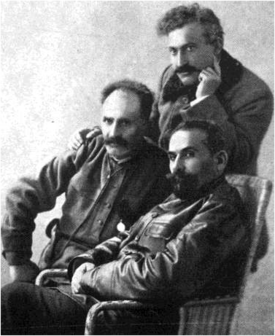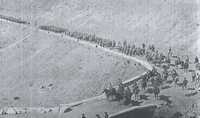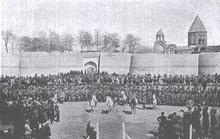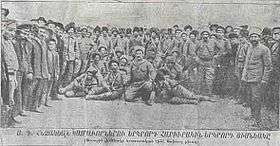Armenian volunteer units
| Armenian volunteer units | |
|---|---|
|
Armenian volunteers | |
| Active | 1914–1917 |
| Country | Russian Empire |
| Allegiance | Armenians |
| Role | Detachment |
| Commanders | |
| Notable commanders | Andranik Ozanian |
The Armenian volunteer units (Armenian: Հայ կամավորական ջոկատներ Hay kamavorakan jokatner) were units composed of Armenians within the Imperial Russian Army during World War I. Composed of several groups at battalion strength, its ranks were primarily made up of Armenians from the Russian Empire, though there were also a number of Armenians from the Ottoman Empire. The Russian Armenian Volunteer Corps took part in military activities in the Middle Eastern theater of World War I.
Establishment

In August 1914, following Germany's declaration of war against Russia, Count Illarion Vorontsov-Dashkov, the Russian viceroy of the Caucasus, approached Armenian leaders in the Tiflis to broach the idea of a formation of a separate fighting corps in the Russian army made up of the empire's Armenian subjects. Already Armenians were being enrolled in the regular Russian army and being sent to the eastern front but Vorontsov-Dashkov was offering to furnish weapons and supplies to outfit four detachments that were envisioned to take part in fighting against the Ottoman Empire (the Ottomans would not enter the war until October of that year). His offer was received warmly and within a few weeks Armenian volunteers all throughout the Caucasus began to enlist. Responsibility for its formation was given to a special committee created by the Armenian National Council, which coordinated its activities from Tiflis, Yerevan and Alexandrapol.[1]
Establishment
The establishment of Armenian volunteer units in the Russian army dates back to the summer of 1914. Count Illarion Ivanovich Vorontsov-Dashkov consulted with the Mayor of Tbilisi Alexandre Khatsian, the primate of Tbilisi, Bishop Mesrop, and the prominent civic leader Dr. Hakob Zavriev about the creation of Armenian volunteer detachments.[2] These units would be employed on the Caucasus front in World War I.
The Armenian volunteer units were mostly from the Caucasus region and were mostly impatient to take arms "to liberate their homeland".[2] In several towns occupied by the Russian forces, Armenian students were ready to join the Russian Empire's Armenian volunteer army.[3] Besides the regular soldiers of the Russian Caucasus Army, nearly 20,000 Armenian irregular units expressed their readiness to take up arms against the Ottoman Empire as early as 1914. The size of these units increased during the war and Boghos Nubar gave the summary of these units in a public latter to the Paris Peace Conference, 1919 as 150,000 Armenians in the Russian Empire's volunteer units and 50,000 Armenian irregular units.[4]
-

1st. Armenian battalion
-

2nd Armenian battalion
-

3rd Armenian battalion
-

4th Armenian battalion
Order of Battle, 1914

The acting commander Andranik Ozanian under Viceroyalty of the Caucasus Illarion Ivanovich Vorontsov-Dashkov.
- Armenian volunteer corps
- 1st battalion (Andranik Ozanian)
- 2nd battalion (Drastamat Kanayan and Armen Garo)
- 3rd battalion (Hamazasp Srvandztyan nom de guerre Hamazasp)
- 4th battalion (Arshak Gafavian nom de guerre Keri)
- Regiment Ararat (Sargis Mehrabyan nom de guerre Vartan)
Andranik's detachment was assigned to Persian Campaign along the Tovmas Nazarbekian. The second, third and fourth units were assigned to Caucasus Campaign. Drastamat Kanayan and Armen Garo directed the 2nd battalion over the offensives around Lake Van, (Vaspurakan). The 3rd & 4th battalion commanded by Hamazasp and Keri were assigned to the positions along the Kars Oblast. Enver Pasha's offensive, the Battle of Sarikamish, was planned with great care, and had a great chance of success if all three wings of the Third Army could reach their objectives on time. The Ottoman tenth army corps, during its march from Olti to Sarikamish, suffered a delay of 24 hours in the Barduz Pass, due to the heroic resistance of the "4th battalion of the Armenian volunteers".[5] This delay enabled the Russian Caucasus Army to concentrate a sufficient force around Sarikamish, resulting in the destruction of the Ottoman Third Army.[6]
Order of Battle, 1915
The acting commander Andranik Ozanian under Viceroyalty of the Caucasus Nicholas Nikolaevich.
During the Siege of Van Armenian detachments provided relief, there were 20,000 Armenian Volunteers[7] under the unit that entered Van on May 16, 1915 which these Armenian battalions led Russian regulars into Van.[8][9] Later same place on October 15, under heavy fight around the region Lake Van, these battalions had lost five hundred (Armenian soldiers) and there were more than twelve hundred wounded or missing.[10]
Order of Battle, 1916
The volunteer detachment contingents, fighting under Armenian commanders, were observed into Russian Caucasian Army as rifle battalions under Russian officers.[10]
Order of Battle, 1917
As the war advanced, the Armenian reservists of the Eastern Front slowly quit from the Tsarist army to join the Armenian national forces. Around 1916, more than 1,000 Armenian soldiers quit from the Tsarist army and joined the Armenian irregular units (Fedayee).[10] In 1917, the Russian Caucasus Front collapsed following the abdication of the Tsar. Beginning with 1917, Armenian National Organization of the Caucasus, Armenian National Council, asked the Armenian soldiers and officers scattered throughout Russian occupied regions to gradually be brought together.[11] The plan was to mobilize Armenians on the Caucasian front. With that purpose in view, an Armenian Military Committee was formed with General Bagradouni as its president.[11] These Armenian conscripts and volunteers in the Russian Army later established the Army Core of the Democratic Republic of Armenia.
See also
| Wikimedia Commons has media related to Armenian volunteer units. |
References
- ↑ Hovannisian, Richard G. (1967). Armenia on the Road to Independence, 1918. Berkeley: University of California Press. pp. 43–44. ISBN 0-520-00574-0.
- 1 2 Hovannisian "The Armenian People from Ancient to Modern Times " p 280
- ↑ The Washington post Friday, November 12, 1914. ARMENIANS JOIN RUSSIANS; the extended information is the image detail for explanation
- ↑ By Joan George "Merchants in Exile: The Armenians of Manchester, England, 1835–1935" page 184
- ↑ (Pasdermadjian 1918, pp. 21)
- ↑ (Pasdermadjian 1918, pp. 22)
- ↑ July, 1915 Letter from Mr. E. Vartanian, an Armenian-American Volunteer in the Russian Service, to His Brother-in-law in Egypt; Dated 9/22 July 1915, and Published in the Armenian Journal "Houssaper," of Cairo.
- ↑ Richard G Hovannisian, Armenians' road to Independence in The Armenian People from Ancient to Modern Times: Foreign Dominion to Statehood
- ↑ [Sv. 2000: T. 30, pp. 101–102]: "On the 6th of May the Armenian flag waved over the citadel of Van. The Vaspourakanis welcomed with great love the Russian soldiers and the Armenian volunteers under the leadership of General Andranik Ozanian."
- 1 2 3 Like One Family: The Armenians of Syracuse by Arpena S. Mesrobian p,53
- 1 2 (Pasdermadjian 1918, pp. 38)
Further reading
- Pasdermadjian, Garegin; and Torossian, Aram. Why Armenia Should be Free: Armenia's Role in the Present War, Hairenik Pub. Co., 1918.
